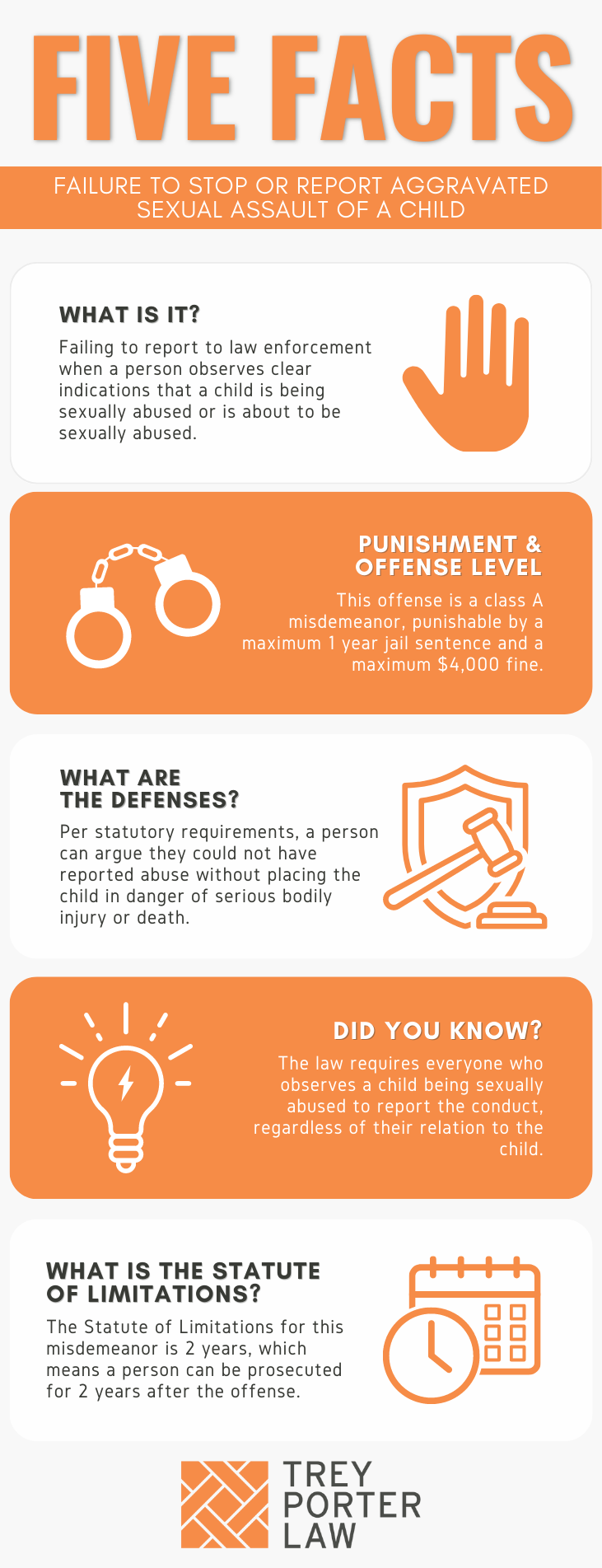WHAT IS FAILURE TO STOP OR REPORT AGGRAVATED SEXUAL ASSAULT OF CHILD IN TEXAS?
The Texas law against failure to stop or report aggravated sexual assault of a child punishes anyone who observes clear indications that a child is being sexually abused or is about to be sexually abused and does not report it to law enforcement immediately.

WHAT IS THE FAILURE TO STOP OR REPORT AGGRAVATED SEXUAL ASSAULT OF CHILD LAW IN TEXAS?
Tex. Penal Code § 38.17. FAILURE TO STOP OR REPORT AGGRAVATED SEXUAL ASSAULT OF CHILD.
(a) A person, other than a person who has a relationship with a child described by Section 22.04(b), commits an offense if:
(1) the actor observes the commission or attempted commission of an offense prohibited by Section 21.02 or 22.021(a)(2)(B) under circumstances in which a reasonable person would believe that an offense of a sexual or assaultive nature was being committed or was about to be committed against the child;
(2) the actor fails to assist the child or immediately report the commission of the offense to a peace officer or law enforcement agency; and
(3) the actor could assist the child or immediately report the commission of the offense without placing the actor in danger of suffering serious bodily injury or death.
(b) An offense under this section is a Class A misdemeanor.
WHAT IS THE PENALTY CLASS FOR FAILURE TO STOP OR REPORT AGGRAVATED SEXUAL ASSAULT OF CHILD IN TEXAS?
Failure to report an aggravated sexual assault of a child is a Class A misdemeanor, punishable by up to one year in county jail.
WHAT IS THE PUNISHMENT RANGE FOR FAILURE TO STOP OR REPORT AGGRAVATED SEXUAL ASSAULT OF CHILD IN TEXAS?
The punishment range for failing to report an aggravated sexual assault of a child, a Class A misdemeanor, is up to one year in jail, and a maximum $4,000 fine.
WHAT ARE THE PENALTIES FOR FAILURE TO STOP OR REPORT AGGRAVATED SEXUAL ASSAULT OF CHILD IN TEXAS?
A person charged with failure to stop or report aggravated sexual assault of a child may be eligible for probation after a conviction, or deferred adjudication without a conviction, for a period not to exceed two years.
WHAT ARE THE DEFENSES TO FAILURE TO STOP OR REPORT AGGRAVATED SEXUAL ASSAULT OF CHILD IN TEXAS?
The statute only punishes people for failing to stop or report sexual assaults against children if they could have done so without placing the child in danger of serious bodily injury or death. A person accused of failing to stop or report aggravated sexual assault of a child may argue he or she could not have acted without placing the child in more danger.
- Is person not related to a child victim of sexual abuse required to report the abuse in Texas? Texas law requires everyone who observes a child being sexually abused to stop or report the conduct, regardless of their relation to the child. In fact, the statute specifically excepts those who have a legal or statutory duty to act, and those who have assumed care, custody, or control of the child from punishment under this statute—people who have that relationship with the child and fail to stop or report sexual abuse are subject to felony punishment under Section 22.04.
WHAT IS THE STATUTE OF LIMITATIONS FOR FAILURE TO STOP OR REPORT AGGRAVATED SEXUAL ASSAULT OF CHILD IN TEXAS?
The limitation period for failing to stop or report aggravated sexual assault of a child, a Class A misdemeanor, is two years.
FAILURE TO STOP OR REPORT AGGRAVATED SEXUAL ASSAULT OF CHILD IN TEXAS
Texas law encourages citizens to protect children by criminalizing the failure to stop or report aggravated sexual assault of a child. The ultimate goal is to prevent horrific crimes against children, and punish those who victimize them.
TEXAS FAILURE TO STOP OR REPORT AGGRAVATED SEXUAL ASSAULT OF A CHILD COURT CASES
The case law regarding failure to stop or report aggravated sexual assault of a child in Texas explains the evidence permitted to be used against a person in a criminal prosecution.
- In Bradford v. State, the defendant and her child’s father were involved in a custody dispute after the father allegedly sexually abused the child in 2012. The 2012 allegations were reported. In 2014, the father picked up the child from school, and the defendant went to police to seek help locating the child. She told police that father had sexually abused three weeks prior, and was convicted of failing to report the abuse. The appellate court reversed, holding the only evidence of the defendant’s failure to report abuse was her own out-of-court admission, which she denied saying during trial.
















